10 NHL stories that defined 2020
As we bid farewell to 2020, it's clear two subjects stood out above the rest.
The past year will obviously be most remembered for the COVID-19 pandemic and the fight for racial justice, and those issues impacted the NHL just as it affected the rest of the world.
There were also more than a handful of other hockey narratives that resonated in 2020, and while they were less significant, each of them struck a chord with hockey fans for one reason or another.
Here are the 10 most memorable NHL stories from the last year:
The COVID-19 pandemic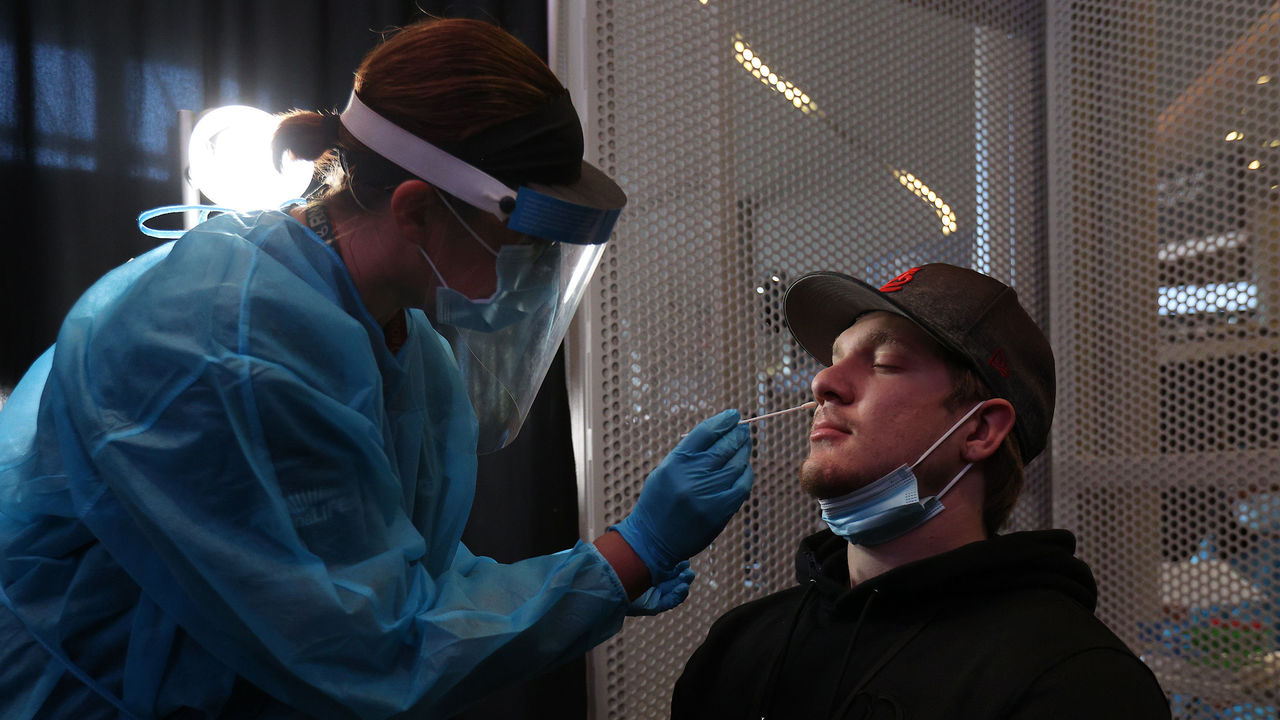 Dave Sandford / National Hockey League / Getty
Dave Sandford / National Hockey League / GettyJust as it did in all facets of life, the COVID-19 pandemic dramatically impacted the NHL and was unquestionably the biggest story of 2020.
The league postponed its 2019-20 season amid the outbreak of the virus in March, and the campaign later resumed in the aforementioned bubbles with an unprecedented 24-team playoff that began in August.
To its credit, the NHL recorded no positive tests in the bubbles as players, executives, and all team and league personnel underwent daily examinations.
However, the financial impact of the pandemic was - and continues to be - undeniable. The diminished free-agent period was the most glaring example of that, but long beforehand, many teams were forced to lay off and furlough employees to account for revenue loss.
The pandemic also forced the postponement of the draft, combine, and annual awards show. The draft was later conducted remotely, and the league handed out its awards in a series of daily reveals, announcing its biggest regular-season honors toward the end of the postseason.
Despite the recent optimism surrounding potential vaccines, the virus remains a significant hurdle for the NHL, and the upcoming campaign promises to be a much greater challenge than its predecessor. Regardless of how smoothly the season goes, one thing is clear: The pandemic is what people will remember most about 2020, and that's certainly true in terms of the NHL as well.
Racial injustice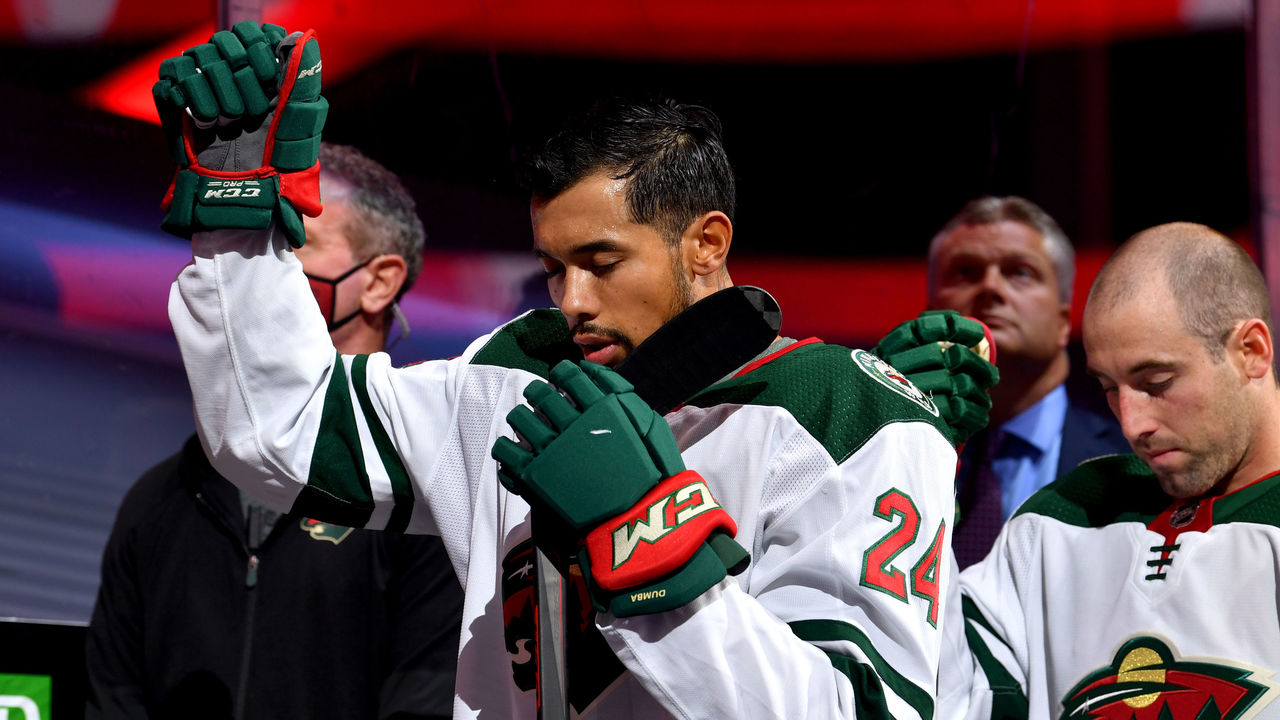 Andy Devlin / National Hockey League / Getty
Andy Devlin / National Hockey League / GettyAmid growing worldwide protests over George Floyd's death in police custody in May, San Jose Sharks forward Evander Kane called on white athletes to speak out against racism, and many in the NHL subsequently did so. But fast-forward to late August, when the NHL didn't immediately act after the NBA postponed playoff games following the Milwaukee Bucks' wildcat strike - a move initiated to protest inequality following the police shooting of Jacob Blake.
While the NBA scrapped its full slate and MLB called off multiple contests, the NHL went ahead with its three-game schedule. The next day, Philadelphia Flyers head coach Alain Vigneault said he "really (had) no idea what's going on in the outside world," later admitting to being oblivious to the protests.
The NHL called off the next two days' games, but only after widespread criticism, most notably from Kane and Minnesota Wild defenseman Matt Dumba, two vocal players of color who helped create the Hockey Diversity Alliance in June. The league returned following a pair of powerful press conferences in the Edmonton and Toronto bubbles in which players came together to explain their mutual mindset.
Prior to a game between the Oilers and Chicago Blackhawks, Dumba gave a poignant speech before becoming the first NHL player to kneel during the playing of "The Star-Spangled Banner." The next day, he raised his fist during the playing of both anthems ahead of the Wild's contest against the Vancouver Canucks. However, Minnesota head coach Dean Evason said the team hadn't discussed showing solidarity with the rearguard.
In early September, the NHL unveiled a long list of anti-racism initiatives, but the HDA severed ties with the league about a month later, accusing it of "performative public relations efforts that seemed aimed at quickly moving past important conversations about race needed in the game."
These developments, as well as the Arizona Coyotes' mishandling of prospect Mitchell Miller, showed that the NHL and its teams still have plenty of work to do to address equality and that institutional racism remains pervasive in the game.
Colby Cave's death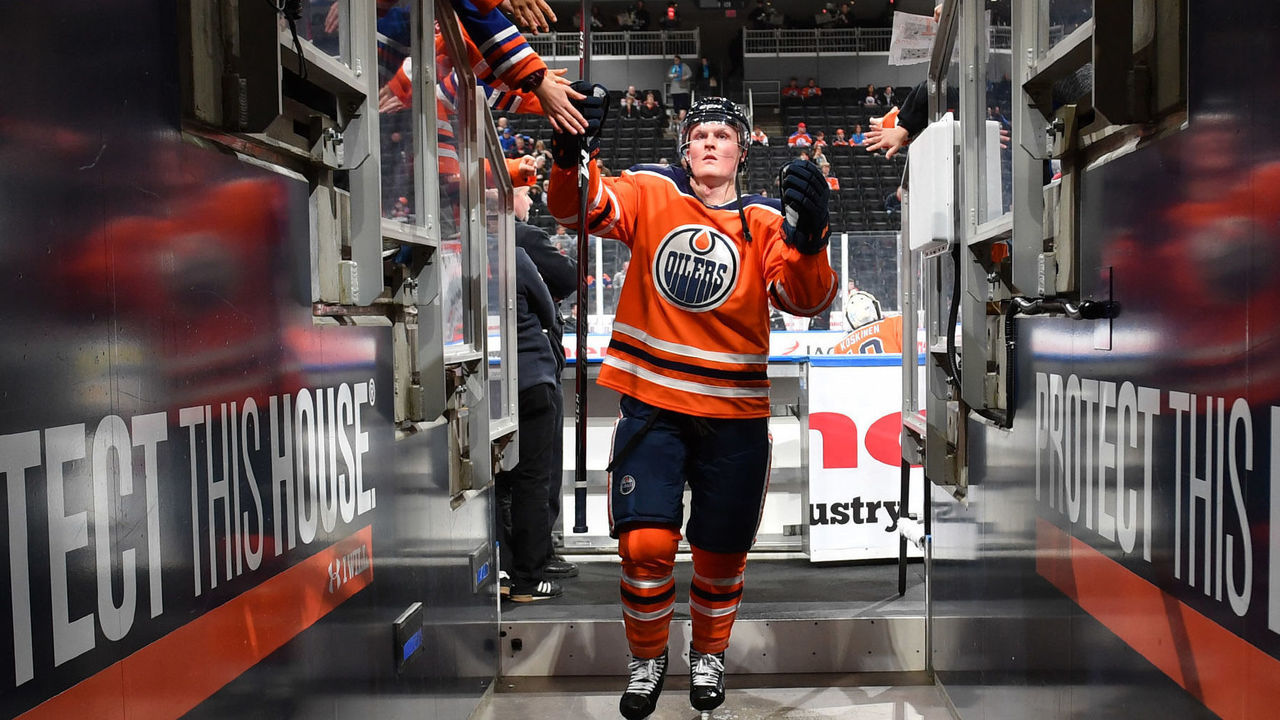 Andy Devlin / National Hockey League / Getty
Andy Devlin / National Hockey League / GettyThe most heartbreaking story about an individual in hockey in 2020 was of Colby Cave, a 25-year-old forward in the Edmonton Oilers system who died in April, just days after being hospitalized due to a brain bleed.
Cave had been in a medically induced coma after undergoing emergency surgery to remove a cyst causing pressure on his brain. Tributes poured in from throughout the hockey world in the days that followed, and the Oilers established a memorial fund in his name.
Residents from his hometown of Battleford, Saskatchewan lined a local highway in their cars to welcome his family home and show support. Cave's AHL teammate, Cooper Marody, released a song for his late friend, and proceeds from that went to the memorial fund.
What made Cave's death so tragic was a combination of his youth and the fact the condition that killed him appeared to arise so suddenly, with such force.
Lightning silence critics, exorcise demons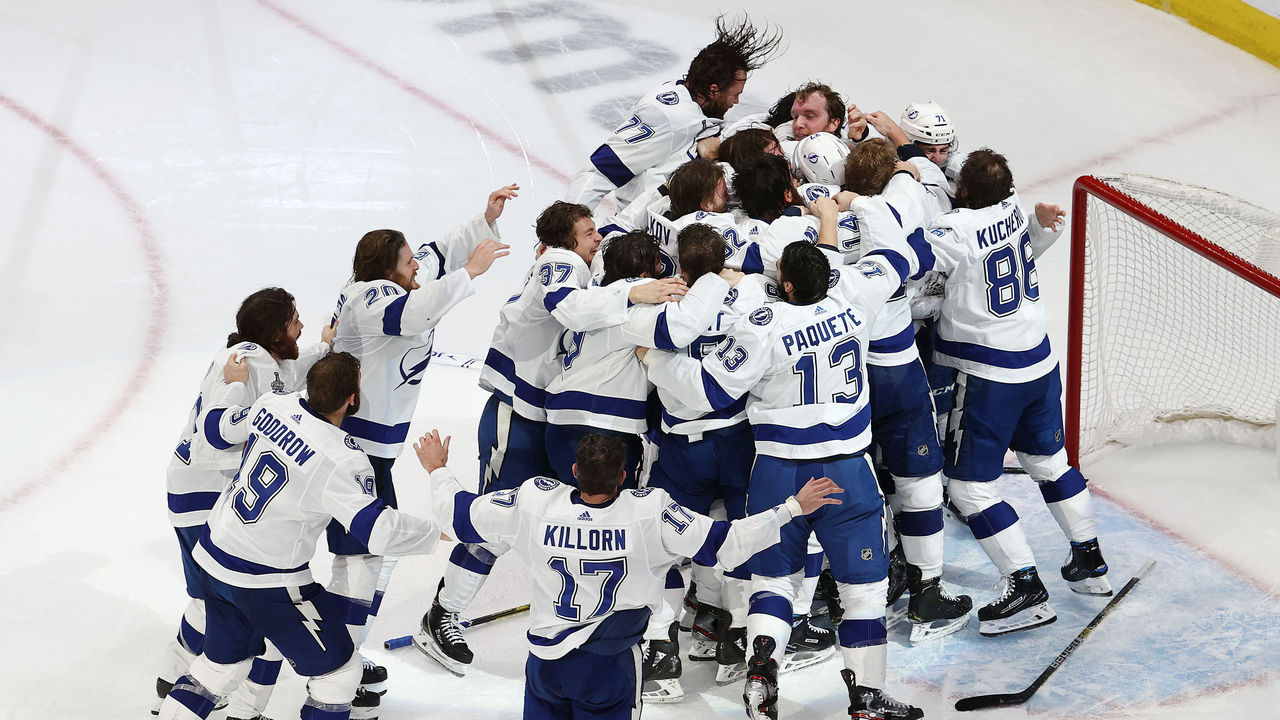 Bruce Bennett / Getty Images Sport / Getty
Bruce Bennett / Getty Images Sport / GettyAfter spending the entire summer of 2019 facing questions about being swept out of the first round by the Columbus Blue Jackets, the Tampa Bay Lightning spent much of the 2019-20 season answering the same questions while undoubtedly asking some themselves.
Whether the Lightning could put their embarrassment behind them was a major subplot in 2020, and the club was clearly determined to remove the "choker" label once and for all. Tampa Bay finished with the NHL's second-best record before the pause and then lost only six games over four best-of-seven series en route to winning the Stanley Cup.
Even more impressively, the Lightning accomplished this without their injured captain for much of their late-season run and most of the playoffs. Steven Stamkos played his final game of the regular season in February. The star center returned for Game 3 of the Stanley Cup Final, incredibly scoring a goal on his third shift before hitting the ice just two more times in Tampa Bay's win.
That was the last time he'd suit up in 2019-20, but his brief, successful cameo undoubtedly inspired his team in its quest to win the title, which it did five nights later.
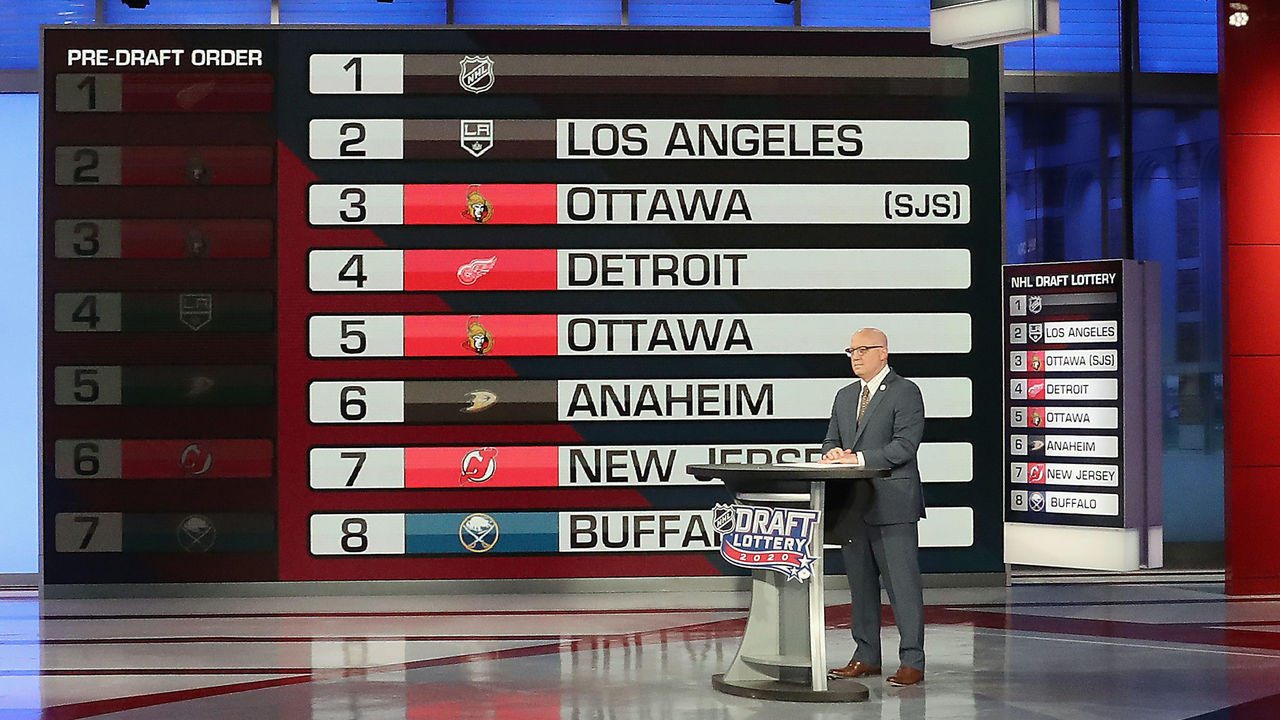 Bruce Bennett / National Hockey League / Getty
Bruce Bennett / National Hockey League / GettyAfter the pandemic work stoppage and the resulting 24-team playoff forced the NHL to adopt new draft lottery rules that included teams competing in the qualifying round, the proceedings played out in a manner typical of 2020.
During the first stage of the lottery in late June, "Team E" - a placeholder representing a postseason squad that had yet to be determined - won the first overall pick despite having a 2.5% chance of doing so.
This meant a second stage was required once the qualifying round of the playoffs concluded, and the next phase took place in August. Despite posting the league's 14th-worst record in 2019-20, the New York Rangers secured the No. 1 pick and the right to select top prospect Alexis Lafreniere. The Rangers were eligible for the lottery after the Carolina Hurricanes swept their best-of-five series.
This lottery was unquestionably embarrassing for the NHL, and it was either a source of amusement or frustration for fans, depending on their allegiances.
Seattle's expansion team gets a name, and it's a hit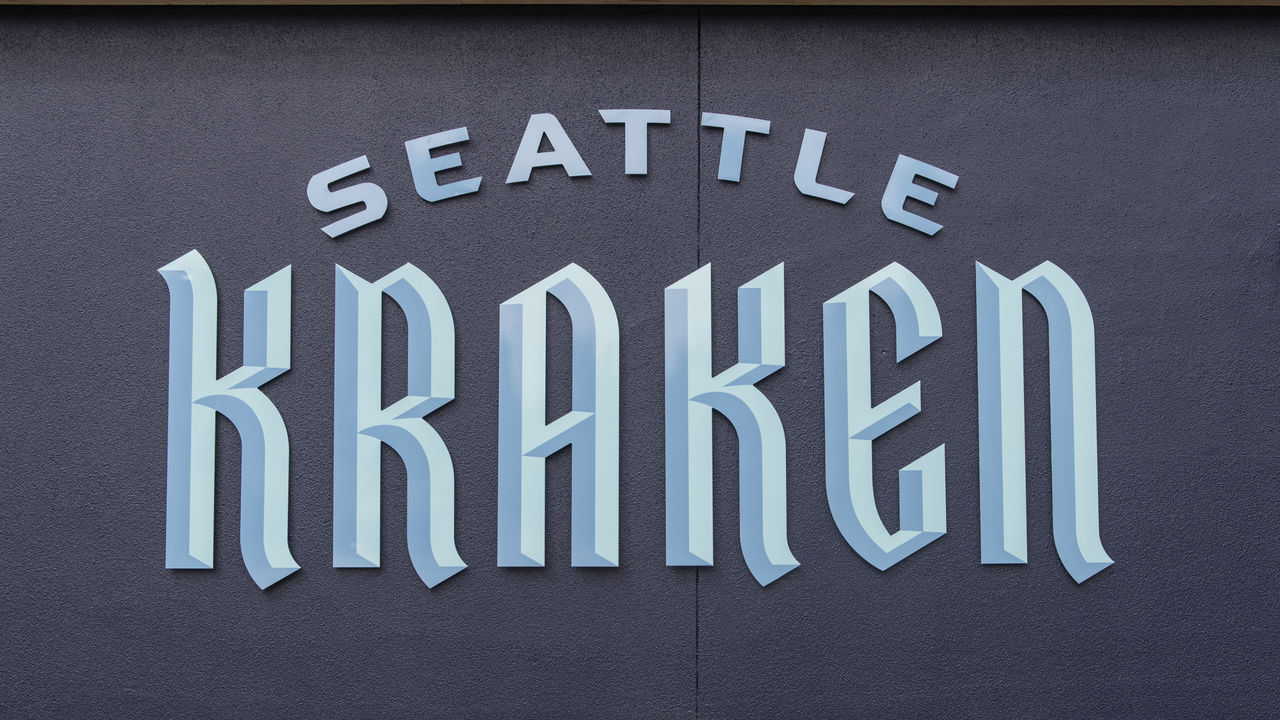 Jim Bennett / Getty Images Sport / Getty
Jim Bennett / Getty Images Sport / GettyUnlike the Golden Knights' gaffe-marred name and logo unveiling in 2017 (not to mention their protracted trademark battle), Seattle's reveal went off without a hitch and was a smashing success.
Though the NHL's newest team delayed their big day out of respect for the pandemic and the protests for racial justice, the long-awaited announcement eventually came on July 23.
Many had hoped the club would use "Kraken" for months, and it came as a pleasant surprise to most of the hockey world when the franchise chose that particular marine moniker. The eye-catching logo and branding made it even better, and the overwhelmingly positive reaction to the Seattle squad's identity was a good sign that the fledgling organization got it right.
David Ayres' magical night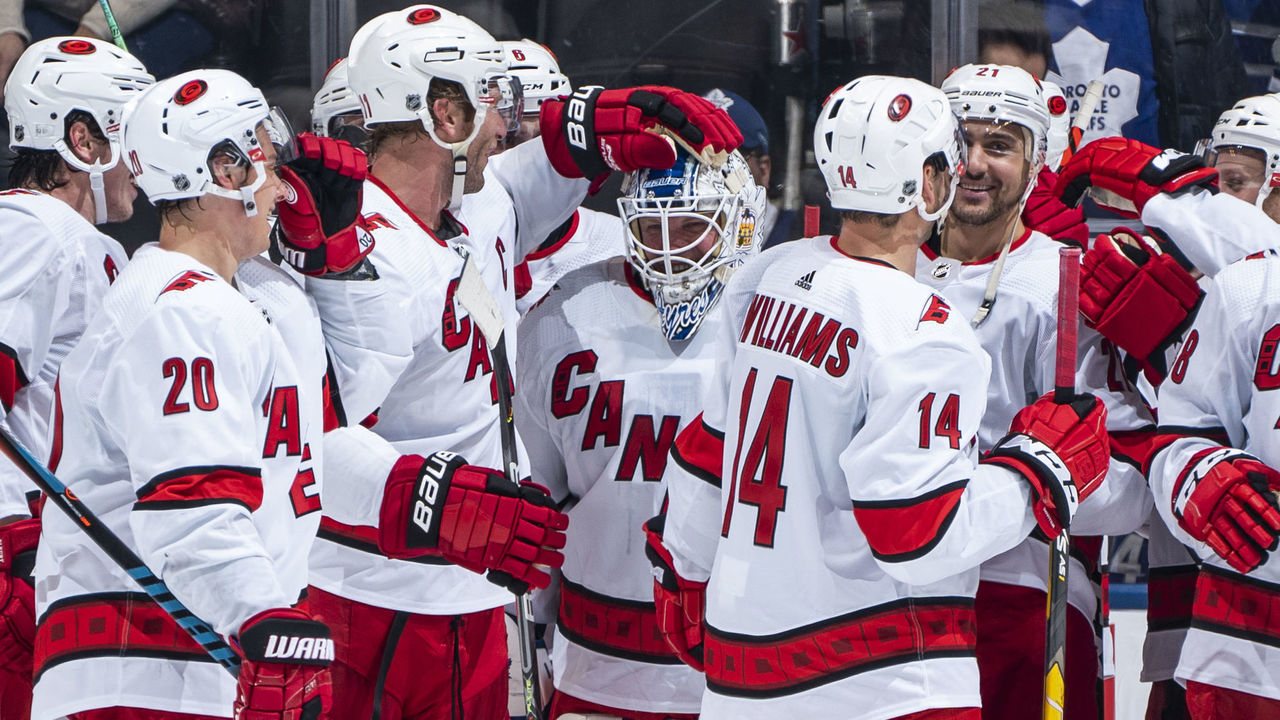 Kevin Sousa / National Hockey League / Getty
Kevin Sousa / National Hockey League / GettyOne of the most unforgettable hockey stories of 2020 was that of David Ayres, the Toronto-based rink operations manager and ice-resurfacing machine driver who earned a win in his improbable NHL debut.
The then-42-year-old performed admirably upon being thrust into action for the Hurricanes as an emergency backup goaltender against the Toronto Maple Leafs at Scotiabank Arena on Feb. 22 following in-game injuries to Petr Mrazek and James Reimer.
Ayres, who was wearing a Maple Leafs T-shirt under his Hurricanes jersey, entered the game in the second period with Carolina leading 3-1. He allowed goals on the first two shots he faced but then stopped the next eight - and even registered a shot on goal of his own - as his temporary teammates rallied in front of him and prevailed 6-3.
The unlikely hero was the first "EBUG" since 2018 and became the oldest netminder in NHL history to win his regular-season debut.
Lindblom's recovery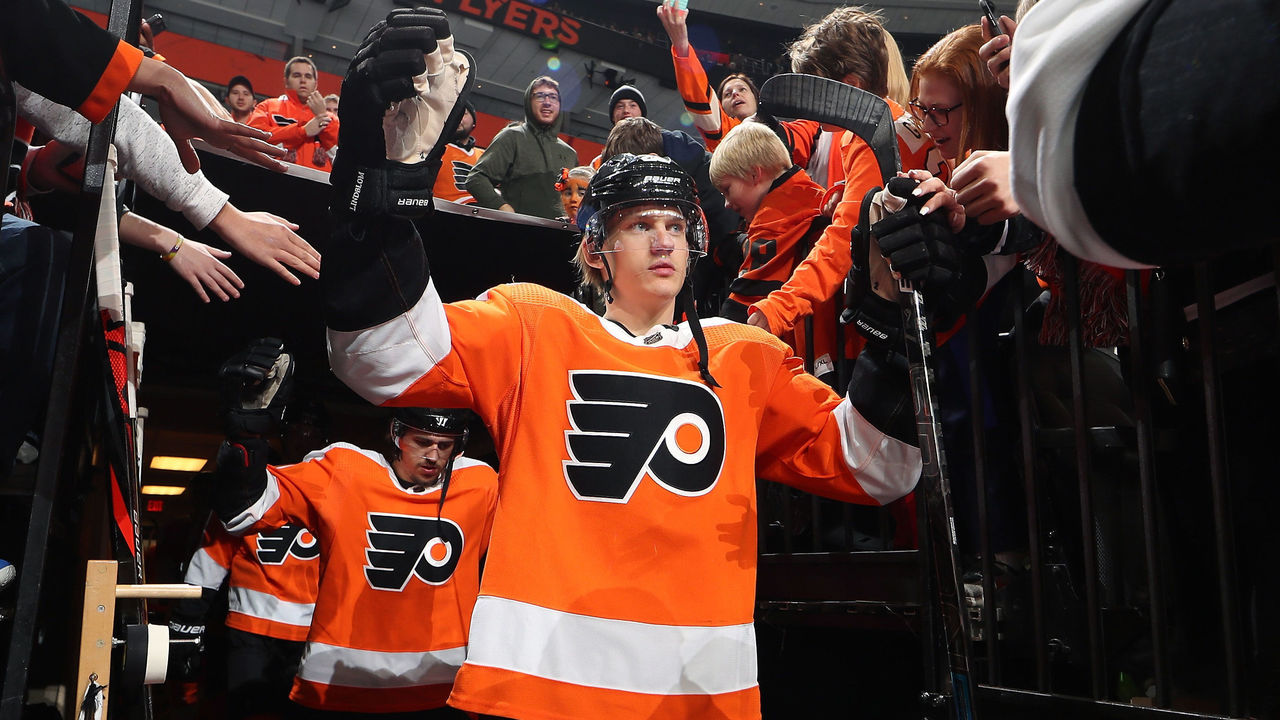 Len Redkoles / National Hockey League / Getty
Len Redkoles / National Hockey League / GettyPhiladelphia Flyers forward Oskar Lindblom was declared cancer-free in December, just over a year after being diagnosed with Ewing's sarcoma.
After undergoing his final treatment in July, he suited up for a playoff game in September - his first NHL action since Dec. 7, 2019 - and played again two days later.
Lindblom, a runner-up for the Masterton Trophy in 2019-20, undoubtedly inspired the resurgent Flyers down the stretch with his presence, and the 24-year-old's recovery was one of the most heartwarming stories of the year.
Free-agent frenzy fizzles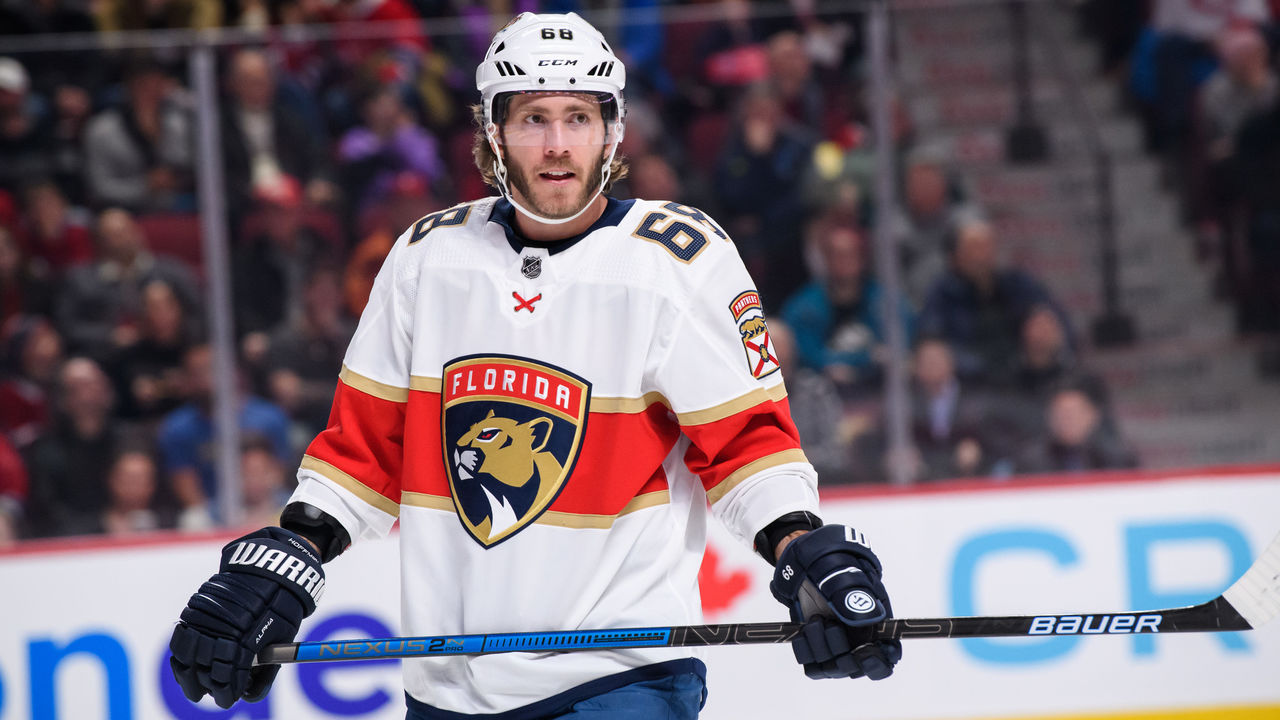 Icon Sportswire / Icon Sportswire / Getty
Icon Sportswire / Icon Sportswire / GettyThe NHL opened free agency on Oct. 9. It's usually a period marked by a flurry of blockbuster signings but was noticeably diminished this year.
While many moves were made on the opening day of activity, the total number of transactions and the amount of money spent on Day 1 paled in comparison to recent years. The majority of new contracts were short-term deals, as well.
The #NHL's COVID-19 Crunch:
- Frank Seravalli (@frank_seravalli) October 9, 2020
2019 #FreeAgentFrenzy: 197 signings, $600,085,000
2020 #FreeAgentFrenzy: 83 signings, $152,350,000
Deals given out: 28 one-year deals, 17 two-year deals, 5 three-year deals, no four or five-year deals, 1 six-year deal.
(through 6pm each day)
The biggest name on the market, Alex Pietrangelo, took his time deciding his future before landing with the Vegas Golden Knights on Oct. 12. The top forward available, Taylor Hall, waited until the day before that to stunningly sign with the Buffalo Sabres.
Erik Haula - the best center on the market - and winger Mikael Granlund joined the Nashville Predators just last week. After that, Mike Hoffman remained the top forward available until surprisingly signing a pro tryout agreement with the cap-constrained St. Louis Blues last Sunday.
The pandemic's financial toll on team budgets was clearly a factor, as were the flat salary cap and the lack of a designated negotiating period before the start of free agency. Also, as the offseason dragged on without an agreement between the NHL and NHLPA on the terms for the 2020-21 season, teams and players justifiably held off on inking new contracts.
Golden Knights fire Gallant for some reason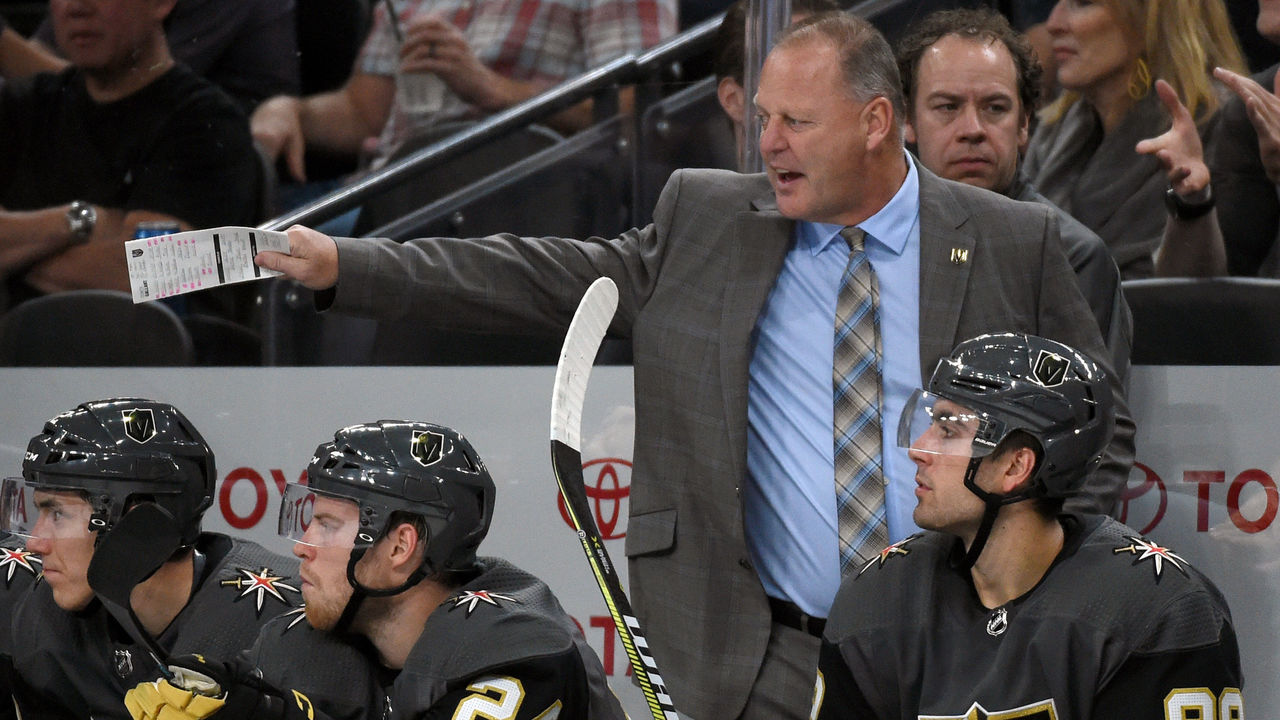 Ethan Miller / Getty Images Sport / Getty
Ethan Miller / Getty Images Sport / GettyGerard Gallant's firing wasn't the only dismissal of an NHL head coach over the last year, but it was by far the most puzzling.
In January, the Golden Knights made the shocking decision to sack the man who had guided them since their inception in 2017-18, when he led the squad to an unexpected Stanley Cup Final appearance and won the Jack Adams Award. Even more stunningly, they replaced Gallant with former San Jose Sharks bench boss - and ex-rival - Peter DeBoer.
It would've been easy to explain the move had the Golden Knights been mired in a lengthy slump, but Vegas had merely lost four straight games. The final defeat came at the hands of the subpar Buffalo Sabres, and Vegas was temporarily outside the playoff picture. Still, the Golden Knights were only three points out of first place in the lackluster Pacific Division.
Remarkably, the experienced coach remains unemployed. He reportedly interviewed with the New Jersey Devils in April and with the Washington Capitals in September for vacancies that were ultimately filled by Lindy Ruff and Peter Laviolette, respectively.
Copyright (C) 2020 Score Media Ventures Inc. All rights reserved. Certain content reproduced under license.